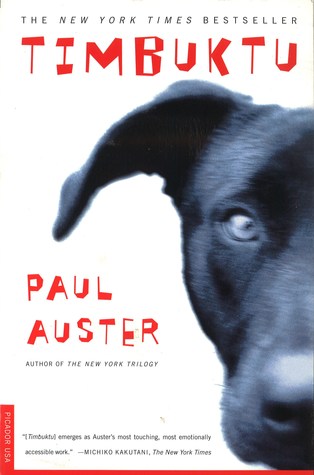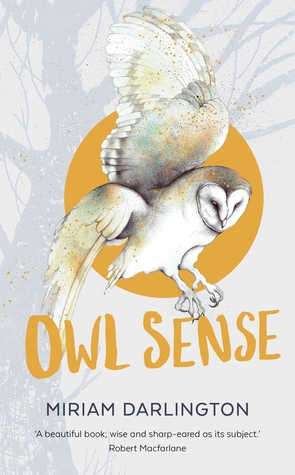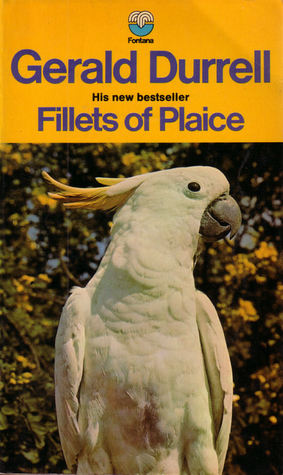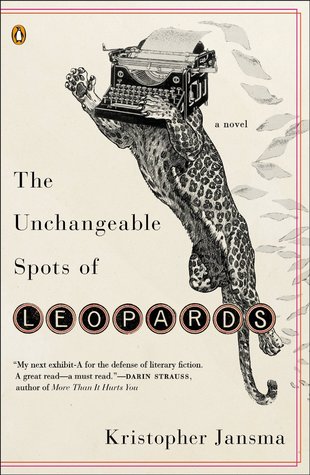Owls and leopards and dogs – oh my! My animal-themed reading project continues. I’m more than halfway through in that I’m in the middle of quite a few more books, but finishing and reviewing them all before the 3rd of September may still prove to be a challenge.
Timbuktu by Paul Auster (1999)
 My first from Auster – and not, I take it, representative of his work in general. Never mind, though; I enjoyed it, and it was a good follow-up to Fifteen Dogs. Like the Alexis novel, this gives an intimately imagined dog’s perspective, taking seriously the creature’s whole life story. The canine protagonist is Mr. Bones, who’s accompanied his mentally unstable writer owner, Willy G. Christmas, from New York City down to Baltimore, where, one August Sunday, Willy wants to find his old high school English teacher before he dies.
My first from Auster – and not, I take it, representative of his work in general. Never mind, though; I enjoyed it, and it was a good follow-up to Fifteen Dogs. Like the Alexis novel, this gives an intimately imagined dog’s perspective, taking seriously the creature’s whole life story. The canine protagonist is Mr. Bones, who’s accompanied his mentally unstable writer owner, Willy G. Christmas, from New York City down to Baltimore, where, one August Sunday, Willy wants to find his old high school English teacher before he dies.
What took me by surprise is that Auster doesn’t stick with Willy, but has Mr. Bones move on to two more living situations: first he’s the secret friend of 10-year-old Henry Chow, whose parents run a Chinese restaurant, then he’s a family pet in suburban Virginia. Although his English comprehension is advanced, he isn’t able to reproduce its sounds like some of the dogs in Fifteen Dogs can, so he can’t tell these new owners his real name and has to accept being called first “Cal” and then “Sparky.” In dreams he still hears Willy’s voice. He assumes Willy is now in the afterlife (“Timbuktu”), and longs to rejoin him.
The novel is tender as well as playful and funny – I loved the passage where Mr. Bones wakes up to pain but doesn’t realize he’s been castrated:
How was he to know that those missing parts had been responsible for turning him into a father many times over? Except for his ten-day affair with Greta, the malamute from Iowa City, his romances had always been brief—impetuous couplings, impromptu flings, frantic rolls in the hay—and he had never seen any of the pups he had sired. And even if he had, how would he have been able to make the connection? Dick Jones had turned him into a eunuch, but in his own eyes he was still the prince of love, the lord of the canine Romeos, and he would go on courting the ladies until his last, dying breath. For once, the tragic dimension of his own life eluded him.

Owl Sense by Miriam Darlington (2018)
 Initially the idea was to see all of Britain’s resident owls, but as often happens, the project expanded until Darlington was also taking trips to Serbia to find a Long-Eared Owl, Finland for a Eurasian Eagle Owl, and France for a Pygmy Owl; and going on a fruitless twitch to see a vagrant Snowy Owl in Cornwall. Each chapter considers a different species and includes information on its anatomy, geographical distribution, conservation status, and any associated myths and anecdotes (The Secret Life of the Owl by John Lewis-Stempel does much the same thing, but with less richness). She has closer encounters with some than with others: when volunteering with the Barn Owl Trust, she gets to ring chicks and collects pellets for dissection. But even the most fleeting sightings can be magical.
Initially the idea was to see all of Britain’s resident owls, but as often happens, the project expanded until Darlington was also taking trips to Serbia to find a Long-Eared Owl, Finland for a Eurasian Eagle Owl, and France for a Pygmy Owl; and going on a fruitless twitch to see a vagrant Snowy Owl in Cornwall. Each chapter considers a different species and includes information on its anatomy, geographical distribution, conservation status, and any associated myths and anecdotes (The Secret Life of the Owl by John Lewis-Stempel does much the same thing, but with less richness). She has closer encounters with some than with others: when volunteering with the Barn Owl Trust, she gets to ring chicks and collects pellets for dissection. But even the most fleeting sightings can be magical.
The book also subtly weaves in what was happening in Darlington’s life at the time, especially her son Benji’s struggles. On the autistic spectrum, he suddenly started having physical problems that were eventually explained by non-epileptic seizures. I would have welcomed more personal material, but that just speaks to my love of memoir. This feels slightly hurried and not quite as editorially polished as her master work, Otter Country, but it’s still well worth reading if you have any interest in birds or nature conservation. (I’ve only seen two owls in the wild: Barn and Tawny.) 
Fillets of Plaice by Gerald Durrell (1971)
 This is a pleasant miscellany of leftover essays that didn’t make it into any of Durrell’s other books. The best is “The Birthday Party,” about an incident from the Corfu years: Larry insisted on taking the fridge along on Mother’s birthday outing to an island, and their boat ran out of petrol. In “A Transport of Terrapins,” teenage Gerry works as a lowly pet shop assistant in London even though he knows twice as much as his boss; and meets other eccentric fellows, such as a bird collector and a retired colonel who has a house full of model figures for war gaming.
This is a pleasant miscellany of leftover essays that didn’t make it into any of Durrell’s other books. The best is “The Birthday Party,” about an incident from the Corfu years: Larry insisted on taking the fridge along on Mother’s birthday outing to an island, and their boat ran out of petrol. In “A Transport of Terrapins,” teenage Gerry works as a lowly pet shop assistant in London even though he knows twice as much as his boss; and meets other eccentric fellows, such as a bird collector and a retired colonel who has a house full of model figures for war gaming.
“A Question of Promotion” is set on one of the animal-collecting expeditions to Cameroon and turned me off a little with its colonial attitude: Durrell talks to the natives in condescending pidgin as he helps prepare a feast for the District Commissioner’s visit. In “A Question of Degrees” he visits two hospitals for a cataclysmic nosebleed, while “Ursula” is about a girlfriend who couldn’t open her mouth without uttering a malapropism. Entertaining scraps for diehard fans; if you’re new to Durrell, though, start with My Family and Other Animals and Menagerie Manor. 
The Unchangeable Spots of Leopards by Kristopher Jansma (2013)
 I’d meant to read Jansma’s debut ever since Why We Came to the City, his terrific novel about five university friends negotiating life in New York City during the recession, came out in 2016. I assumed the leopards of the title would be purely metaphorical – a reference to people not being able to change their inborn nature – and they are, but they’re also surprisingly literal in the one chapter set in Africa.
I’d meant to read Jansma’s debut ever since Why We Came to the City, his terrific novel about five university friends negotiating life in New York City during the recession, came out in 2016. I assumed the leopards of the title would be purely metaphorical – a reference to people not being able to change their inborn nature – and they are, but they’re also surprisingly literal in the one chapter set in Africa.
Jansma’s deliciously unreliable narrator, never named but taking on various aliases in these linked short stories, is a trickster, constantly reworking his life into fiction. He longs to be a successful novelist, but keeps losing his works in progress. We think we know the basics of his identity – he’s the son of a single mother who worked as a flight attendant; he grew up in North Carolina emulating the country club and debutante class; at Berkshire College he met his best friend and rival Julian McGann in creative writing class and fell for Julian’s friend Evelyn, the great unrequited love of his life – but Part II introduces doubt by calling the characters different names. Are these the ‘real’ people, or the narrator’s fictionalized versions?
The characters go on a bizarre odyssey that moves the setting from New York City to Nevada to Dubai to Sri Lanka to Ghana to Iceland to Luxembourg, finally ending up back in the very airport terminal where it started. As I remembered from Why We Came to the City, Jansma interleaves Greek mythology and allusions to other writers, especially F. Scott Fitzgerald. The coy way in which he layers fiction on fiction reminded me of work by John Boyne and Tom Rachman; other recommended readalikes are The Goldfinch and Orchid & the Wasp. 
Thanks for alerting me to Owl Sense. You’ve reminded me of the barn owl we named Oscar for out week in an Isle of Wight cottage. The highlight of my day was watching him get up at 6pm every evening, stretch, preen then fly off for breakfast.
LikeLiked by 1 person
Do you follow dovegreyreader? She’s been monitoring her local barn owl chicks in Devon and posting lots of photos.
LikeLike
Oh, wonderful! Thanks so much for telling me.
LikeLike
I feel like your project this year is highlighting the fact that I just don’t like books about animals, despite getting on OK with them in real life!
LikeLike
That’s fair enough! Some of my choices are straight-up nature books, while others just happen to have an animal in the title or on the cover. The Jansma is the least animal-y book I’ve read for the challenge so far. It’s a coy postmodern mystery about a would-be writer, told by an unreliable narrator, and I would highly recommend it.
LikeLiked by 1 person
Good to know!
LikeLike
So glad you enjoyed Timbuktu.
LikeLiked by 1 person
I’ll certainly try something else by Auster.
LikeLike
I loved the Miriam Darlington. She came a couple of years ago to talk at Niddfest (http://www.niddfest.com/) and was an engaging speaker. Now, nature books I like, as you know. Animal books … not so much.
LikeLiked by 1 person
I’ve seen her at New Networks for Nature before. I meant to nab her last year for a signature in her poetry collection, but didn’t quite manage it. So, nature + animals is the ticket for you 🙂
LikeLiked by 1 person
Yup. Cosy sagas? Nope.
LikeLike
Do you mean Watership Down and Duncton Wood sort of things? (anthropomorphism)
LikeLiked by 1 person
Yes, those, and also heart-warming stories about The Best Dog Ever and that sort of thing. I can’t think of an actual example just now.
LikeLike
Twee stuff like that wouldn’t be for me either.
LikeLiked by 1 person
what a beautiful cover for Owl Sense – is it illustrated?
LikeLike
There’s one black-and-white owl drawing at the start of each chapter.
LikeLike
Beautiful…..
LikeLike
I am sold on Timbuktu! Something about the tone of that passage reminds me very much of his essays in Winter Journal.
LikeLiked by 1 person
Cool! I’d like to read that one.
LikeLike
I’ve had Jansma’s book on my list since it first came out, and it’s still tempting me. I love the cover.
And now I have Timbuktu calling to me – it sounds similar to A Dog’s Purpose or Racing in the Rain.
LikeLiked by 1 person
Timbuktu is a bit like those books, but less sentimental. I assumed that it would be narrated by the dog; it’s not, but it’s mostly from his perspective, though with a few omniscient moments so that you know things Mr. Bones doesn’t, about what’s going to happen when he goes to the vet, etc.
LikeLiked by 1 person
I’ve recently gotten into birding and started really enjoying reading about birds, so I’ll definitely be adding Owl Sense to my to-read list.
Why We Came to the City and The Unchangeable Spots of Leopards are some of my favorite books. Jansma’s writing style just works for me and I thought the way the writer’s manuscripts and his life blurred together in Leopards was very cool.
LikeLiked by 1 person
Jansma is nowhere near as well known as he should be. I can’t wait for his next book!
You’d likely enjoy the two birdy reads from my first batch of Summer Books: https://bookishbeck.wordpress.com/2019/06/29/20-books-of-summer-1-4-alexis-haupt-rutt-tovey/.
LikeLiked by 1 person
My husband was given Timbuktu ages ago and it languished on his bedside table unread for months till I got sick of dusting it and relocated it to the bookshelves downstairs. Now I know I must read it, it sounds great, though the excerpt about him being neutered is poignant. Our dog is neutered. It’s a necessary evil as before the op he was always humping furniture etc to no avail, an itch he could not scratch, he really was not a happy chap and he would no doubt have run away to find love. But still I feel guilt. The book sounds wonderful, thank you for alerting me to the overlooked gem on our shelves.
LikeLiked by 1 person
It’s only about 180 pages — a nice quick read.
LikeLiked by 1 person
[…] this year, I’d read only one book by Paul Auster: Timbuktu, which fit into last year’s all-animal 20 Books of Summer for its canine main character. This […]
LikeLike
[…] try Auster. On Monday I reviewed Winter Journal and the New York Trilogy. Adding in last year’s review of Timbuktu, I’ve now read six of Auster’s books and skimmed another one (the sequel to Winter […]
LikeLike
[…] I’m going to give them away. They are Timbuktu with its dog narrator (Rebecca’s review here), The Brooklyn Follies which is fab and funny, and Report from the Interior (Rebecca’s review […]
LikeLike
[…] Fillets of Plaice by Gerald Durrell […]
LikeLike
[…] Another “leopard” title I’ve read is The Unchangeable Spots of Leopards by Kristopher Jansma, a fun selection from my 20 Books of Summer in 2019. A linked short story […]
LikeLike